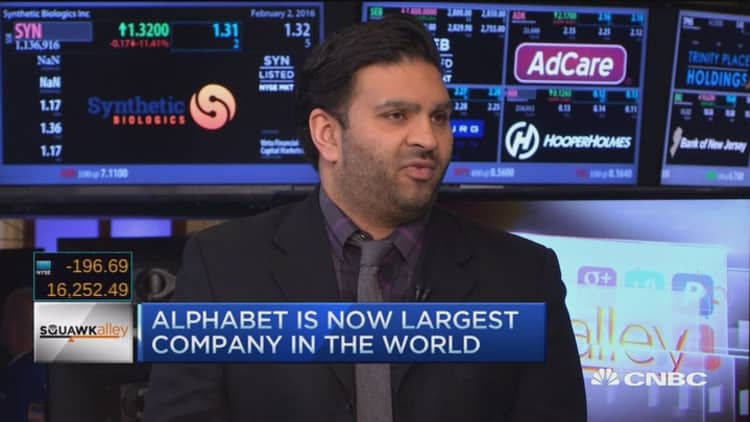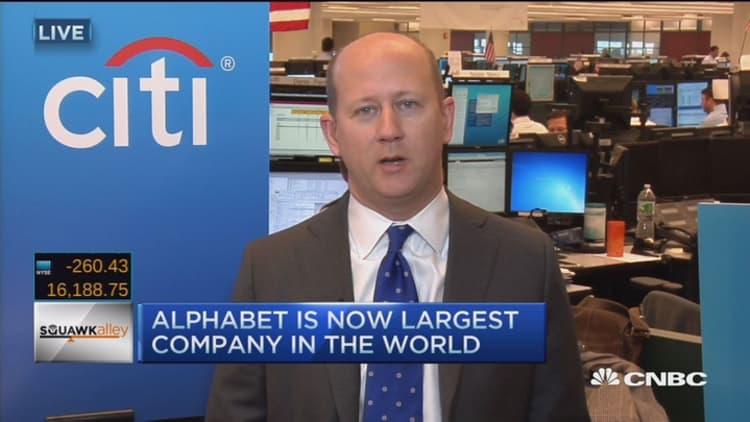


With feelers in businesses from videos to autos, it may be no surprise that Alphabet, the holding company behind Google, managed to post better-than-expected fourth-quarter earnings. What surprised some is the main reason why.
"Revenue growth in Q4 underscored the strength of our businesses globally, with consolidated revenue growth accelerating meaningfully versus last year," said Ruth Porat, Alphabet's chief financial officer, on an investor conference call. "The primary driver was increased use of mobile search by consumers, benefiting from our ongoing efforts to enhance the efficacy of mobile search."
Not only are Google's sales still driven by its hallmark search function, but by mobile search — an area where Google was thought to be losing ground as consumers move from browsers to searching within apps.
So did Wall Street underestimate Alphabet?
Macquarie Capital analyst Ben Schachter released a mea culpa in a Tuesday morning research note, writing, "Clearly, our concerns about structural and competitive challenges to core search were wrong."
But Schachter was far from the only pundit to point out Google's challenges on mobile in the weeks leading up to earnings. Analysts from RBC Capital Markets and Jackdaw Research were also quick to highlight how Facebook's video offerings and Amazon Prime have reduced users' need to leave their app to search for content or goods.
"It's taken Google a little longer than Facebook to have their 'mobile moment,' where mobile is not viewed as a drag, but as an opportunity," Mark May, Citi senior Internet analyst, told CNBC. "I think [the fourth quarter] was a huge milestone for them. Mobile search is now approaching, if not surpassing, 50 percent of their total search business, and they're showing they are able to monetize it effectively. "
Though fellow advertising platform Facebook has more app-based real estate on users' home screens, it's essentially in a different market than Google, Channing Smith, managing director of equity strategies at Capital Advisors and an Alphabet shareholder, told CNBC's "Squawk Alley" on Tuesday.
"Facebook is more in the display advertising," Smith said. "I think what a lot of investors are overlooking is that Google made a big step in November by adding the ability to search within apps. If you think about mobile users, they spend 90 percent of their mobile time on apps, and now ... we think [Google] will be a major player going forward. I wouldn't worry about [Facebook and Google] crossing paths for a couple of years. This is a big market."
And Google has also made progress getting more space on users' home screens — at least, on the screens of those who use the Google Play store.
Google-published apps like Gmail and Google Maps saw "huge" year-on-year growth when it comes to downloads on Android devices, according data from Sensor Tower, a company that provides metrics on mobile advertising and app revenue.
Part of the download growth was thanks to a big spike (more than 5 million) directly after the holiday season. But it was also driven by the launch of Google Photos, and organic downloads, according to Wes McCabe, who works in product marketing at Sensor Tower. Put simply, Google has the power to drive app growth by promoting, featuring and advertising its apps to users of the Google Play store.
Given the rhetoric on Alphabet's earnings call Monday evening, Google isn't slowing its pursuit of the money in mobile.
On Alphabet's earnings call, Google unit CEO Sundar Pichai highlighted growth in the company's Android operating system and hardware as well as software and mobile search. And the company is reportedly looking to increase its control of Nexus Android phones, further tightening the vertical integration of its mobile platform.
One step is to penetrate emerging markets, Smith said — a task that Facebook has launched successfully and Android is already primed to do.
"The business model is much different ... those people are not going to be buying Apple phones, they're going to be buying cheaper models," Smith said. "And who are these cheaper phone makers going to partner with? They're going to partner with Google for an Android software. And that's where Facebook, Google are going to make their money. Once users get on those platforms, that's when the revenue opportunities will really increase."
And though Alphabet is still booking a loss on many of its offline enterprises, there may be mobile potential there too. Smart home system Nest, for instance, falls under Alphabet's domain.
Market research and consulting firm Parks Associates estimates that 19 percent of households with broadband in the U.S. already own a smart home device, thanks in part to increased smartphone ownership.
"Mobile devices .... that's the default user interface outside the home or sometimes even in the home," said Tom Kerber, director of research at Parks Associates. "The smartphone is critical — it opened up the market when smartphones came out."
Alphabet shares rose 1.3 percent Tuesday.
— CNBC's Jacob Pramuk and Christine Wang contributed to this article.
Disclosure: Alphabet is an investment banking client of Citi.






